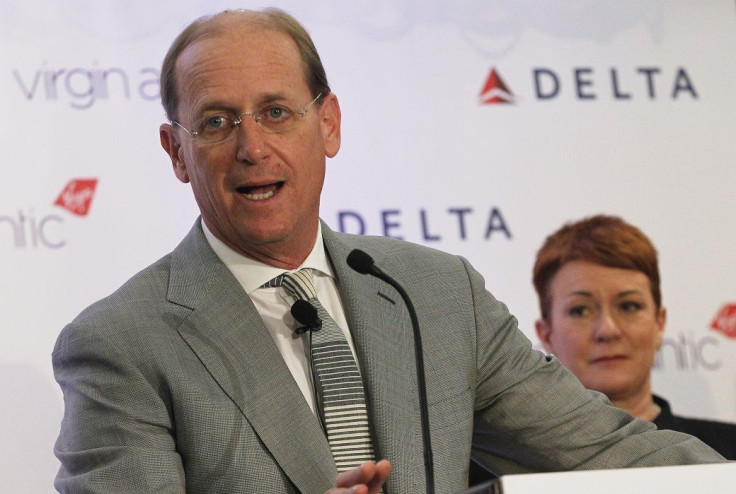Delta Air Lines (DAL) CEO Richard Anderson Charts Independent Course: Buying A Refinery, Half Of A Rival, And Avoiding Gas Guzzlers

The head of Delta Air Lines Inc. (NYSE:DAL), the world's second-largest airline behind United in passenger-miles flown, reads actual newspapers rather than digital ones, doesn't have a personal email account and still uses an old Blackberry.
But CEO Richard Anderson's apparent indifference to current technology extends only to his personal life; for his Atlanta-based employer Anderson has emerged as one of the most creative and innovative leaders in the industry. For example, since he began running Delta, it has invested in U.S. airport terminals, bought stakes in foreign companies and even purchased an American refinery to stabilize and cut its fuel costs.
"There's a lot of material for creativity in this business," Anderson said Friday in New York at a Society of American Business Editors and Writers conference. "It's a big complicated industry with a lot of dynamic. Geopolitical dynamic."
In the last three and a half years, Delta has turned a profit of $3.2 billion, and the 2012 purchase of a Phillips 66 refinery, along with less expensive petroleum, will result in Delta's jet fuel costs falling this year by an estimated 8 percent, according to Standard & Poor's.
Besides costly fuel, airlines have had to deal with passengers' increasing frustration at airport lines. Indeed, U.S. airports are known for long wait times. In September, the average wait for customs at JFK's Terminal 4 was 18 minutes, with a maximum time of 1 hour and 50 minutes, according to U.S. Customs and Border Protection.
"You go through Heathrow, you go to Beijing, you go to Shanghai, you're through in 10 minutes," Anderson said, adding that despite their strong infrastructure, American airports simply can't compete with international destinations. Given the importance of the travel and tourism industry to the U.S., "It's an embarrassment," he said.
In response, Delta in May unveiled its $1.4 billion Terminal 4 at JFK airport, and last week announced that it would be paying for automated passport machines -- hoping to make the process faster.
"Airports are our factories," Anderson said, "We've got to continue to make investments in the infrastructure."
Before being named Delta's CEO in 2007, Anderson worked in Continental's legal department and then became CEO of Northwest in 2001. But he's not known for his legal prowess.
"You're looking more at a Texan than you are at a lawyer, when you look at his history of risk-taking," said Craig Jenks, president and founder of analysis firm Airline/Aircraft Projects Inc.
"He's a new ideas guy," Jenks said, citing Delta's $180 million purchase of the oil refinery in June 2012 as an example, which was "less successful in its early implementation than it was planned."
Anderson said the purchase was an attempt to help control prices on jet fuel, which can be as much as 30 percent higher than diesel. By purchasing the refinery, Delta cut out the middleman.
"We control 100 percent of our business," Anderson said.
Delta's ability to refine its own jet fuel is a distinct advantage for international competition. Many low-cost European airlines, for example, receive taxpayer subsidies that let them use bigger planes without bearing the resulting increased cost of fuel.
"The A380 is, by definition, an uneconomic airplane unless you're a state-owned enterprise with subsidies," said Anderson, when asked why Delta chose not to purchase the four-engine, double-decker Airbus A380, the world's biggest passenger airplane. Instead Delta flies smaller, more fuel-efficient jets that compete effectively with European rivals.
"The best-performing entity in our business right now is Europe," he said.
Delta's recent $360 million purchase of 49 percent of Virgin Atlantic means it will increase to 35 percent its share of all passenger seats on the JFK-to-Heathrow route, where Delta competes against British Airways, a unit of International Consolidated Airlines Group (LON:IAG) and American Airlines.
"Despite my dullness, Richard Branson is a great partner," Anderson said, adding that there is a lot Delta will be learning from Virgin as they work together to woo higher-paying business fliers.
So far, Anderson's strategies seem to be working. According to data compiled by Bloomberg, 15 out of 16 analysts have a Buy recommendation on Delta shares, which have more than doubled this year. Delta’s 2012 revenue was $36.67 billion, while American Airlines owner AMR Corporation (OTCMKTS:AAMRQ) came in at $24.91 billion.
The United Kingdom isn't Anderson's only focus abroad. Growth in Asia is on the horizon as well. Earlier this week Delta bid against United Continental Holdings Inc. (NYSE:UAL) for spots at Japan's Haneda Airport in the middle of Tokyo. Next year Anderson said Delta will be focusing on the Western Hemisphere.
A few years ago Delta bought stake in Brazil's Gol Linhas Aéreas Inteligentes SA airlines (BVMF:GOLL4), and this year it paid $65 million for a stake in AeroMexico (OTCMKTS:GRPAF).
"In 2014 our most significant growth will be in Latin America," Anderson said. “You’ve got to just embrace the change."
© Copyright IBTimes 2025. All rights reserved.






















